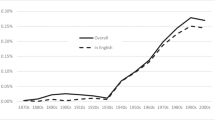Abstract.
Using property-rights tools, this paper develops a theory of the transition from despotic to rule-of-law regimes, relying on the notion that rulers and subjects are interested in maximizing wealth. Keeping subjects in check enhances despots' internal security, but at the cost of lower output, and of less wealth for the despots. Enhanced wealth is especially valuable for protection against outside threat. Subjects will increase output only if provided with rights to, for example, ownership, movement, and voting. Despots can guarantee them these rights by relinquishing some of their own power.
Similar content being viewed by others
Author information
Authors and Affiliations
Additional information
Received: January 25, 1999 / Accepted: May 10, 1999
Rights and permissions
About this article
Cite this article
Barzel, Y. Property rights and the evolution of the state. Econ Gov 1, 25–51 (2000). https://doi.org/10.1007/s101010050004
Issue Date:
DOI: https://doi.org/10.1007/s101010050004



